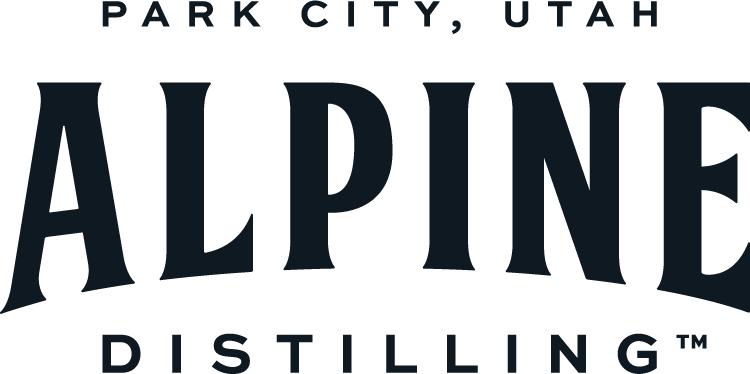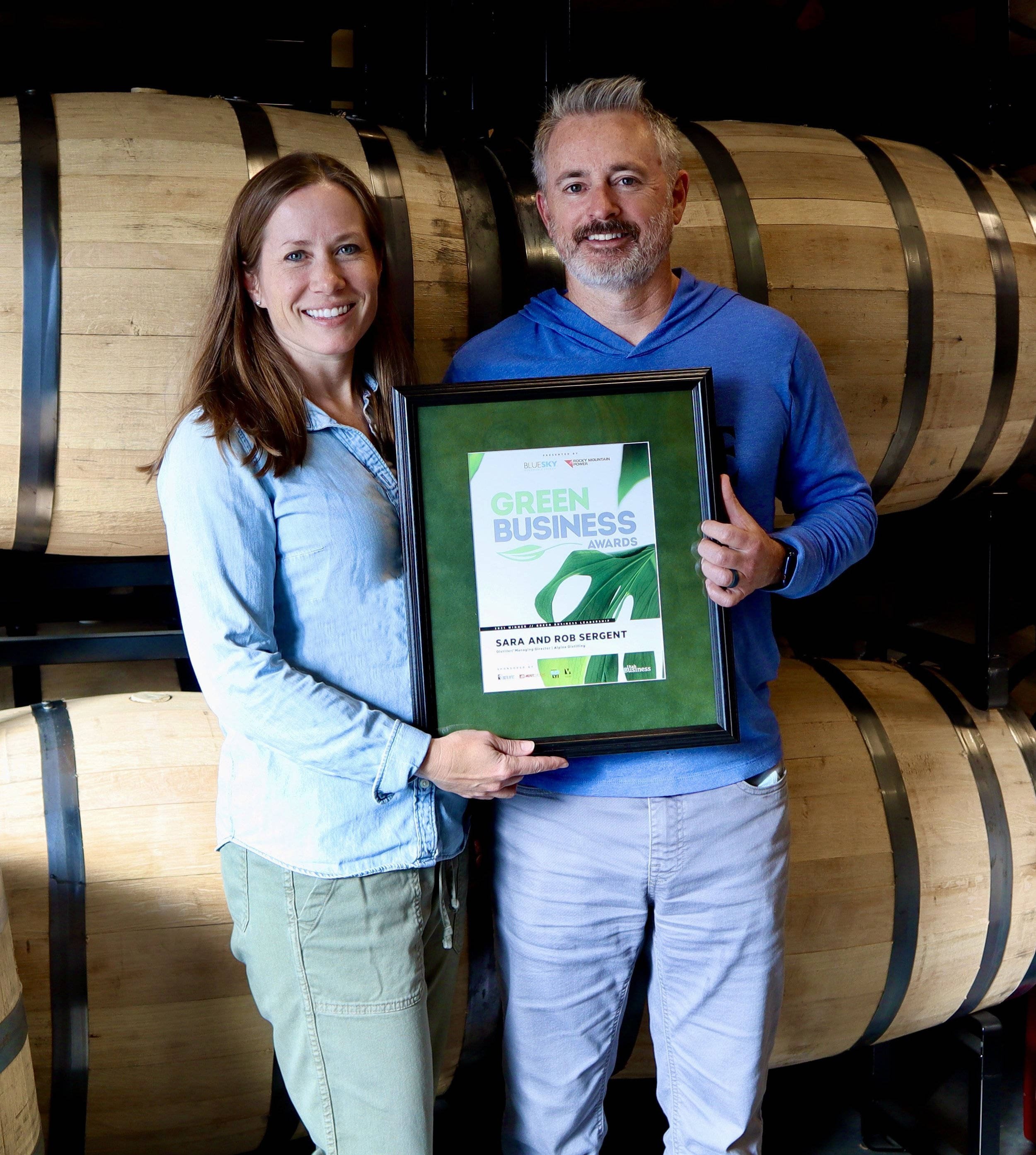Sustainability in Action
At Alpine Distilling, sustainability is not a marketing line or a badge we chase. It’s a responsibility we feel to our community, to our employees, to the mountains that surround us, and to the people who enjoy what we create. I grew up believing that stewardship begins with the choices we make every day, especially the small ones. When we founded Alpine, we promised ourselves that we would look at every corner of our operations, all the quiet, unglamorous details, and build a distillery that respects the resources it depends on.
Water: Treating Our Most Precious Resource as exactly that, Precious
Park City sits on a fragile high-mountain watershed. Water is always the first thing we think about and our impact on it, the final consideration of any operational decision.
Our production water starts around 800 TDS, far too mineral-rich for consistent fermentation or proofing, or even drinking. Instead of using chemicals or traditional reverse osmosis with a high waste ratio, we installed a bespoke nano-filtration and UV treatment system that brings the water down to ~15 TDS with a 1.5:1 water efficiency ratio. Most distilleries operate closer to 3:1, meaning they waste twice as much water as we do. With published usage for craft distilleries up to 40gal/spirits produced, we are accomplishing our stated goal of responsible water usage at an average of 16gal/spirit for our botanical and Vodka products and 30/gal for our whiskies.
We also built a closed containment drain system so that no grain solids, wash, or alcohol ever enters Park City’s municipal water. Even during heavy production days, not one ounce from our mash or still is allowed to reach the city sewer. Ensuring that the concept of “downstream” applies to our most core production effort.
Steam, Heat, and Energy: Choosing the Long-Term Path
Distilling takes energy, a lot of it. Early on, we chose to rely on efficient, low-pressure steam (around 15 psi). Steam jackets give us even heat, cleaner distillation, and, importantly, a much higher energy efficiency per gallon. We use these jackets, or bain-marie, on our MashTun and our American-made copper Pot Still. Fun note that the bain-marie is credited to Marie the Jewess, one of the most important early botanical distillers and someone I’ve studied extensively. A good influence remains influential, I suppose…
We are currently operating at an energy cost of 6.55 kWh/gal and ~$1.02 electricity cost per finished gallon. The BIER Sustainable Spirits Initiative documents a norm of 7-15kWh/gal for craft distilleries. With the business shift increasing for our botanical spirits and Vodka, we forecast lowering our usage to 6kWh/gal by the end of 2026.
Our boiler is fitted with a heat-recovery loop, capturing the energy from returning steam and rerouting it to produce hot water for cleaning and general use. This cuts our natural gas demand and keeps our facility heat self-contained. Our system saves between 25-40% over a separate secondary hot water system.
Our second still, a pressure-driven column, produces spirit at an exceptionally efficient ratio and can run ~85 gallons in about 90 minutes, using the same boiler and the same steam system. This shared infrastructure keeps our energy footprint tight, predictable, and significantly lower than comparable setups.
And across the facility, lighting is LED, and our aging warehouse (rickhouse) uses no climate control at all, only a low-amp circulation fan. The barrels breathe naturally with the seasons, just as they have for centuries, without compressors, chillers, or heaters humming round the clock.
Materials and Waste: Small Choices, Big Reductions
I believe waste tells a story about how a company treats the world outside its walls. At Alpine, our waste is remarkably small for our size:
Bottle cases from our glass suppliers are reused for our final packaging. Pallets are reused until they can no longer be repaired, only then do they leave our facility. We clean equipment with our own distillation “heads,” repurposing what many distilleries throw away. The only chemicals on site? Simple Green and vinegar. Nothing caustic, nothing harsh.
These are simple choices, yes, but simple does not mean small. When you multiply them across hundreds of production days, the impact becomes very real.
Power and Emissions: Reducing Impact Without Greenwashing
We participate in our utility’s Renewable Energy Program, and at our scale, energy efficiency is often more meaningful than offsets. Here’s where the “rubber meets the road” for us:
LED conversion saves us roughly 4–6 kWh per fixture per day.
Steam recycling reduces boiler runtime by an estimated 12–18%, depending on the season.
Our choice not to climate-control the rickhouse avoids what would otherwise be the single largest electrical draw in our business, often exceeding 25–30% of a distillery’s consumption.
We measure these numbers because accountability matters. We don’t want vague commitments; we want real reductions.
Culture: Sustainability Is Only Real When It’s Lived
I often tell our team: we’re not trying to be the greenest distillery in the world. We’re simply trying to operate in a way that lets us look our community in the eyes and say, “Yes, we’re doing our part.” One of the pillars of our strategy is “to consider those effected by our efforts”, it’s in our business dna.
That culture is bigger than policies. It shows up in the way our team reuses materials without being asked. In the way we collect, recycle, and dispose at our bar. In how we choose partners who share our mindset (partners over players). In how our kids understand why we make the decisions we do. It’s all connected.
At the Alpine Distilling Social Aid & Pleasure Club, we’ve built sustainability into the lounge from the ground up. The same green measures used in our distillery are fully integrated into daily operations, including comprehensive glass recycling, a structured food-waste and food-waste-management program, and highly efficient systems that allow us to operate with less than one bag of trash per shift. Our commitment to responsible stewardship has been recognized repeatedly: Utah Business of the Year, Green Business of the Year (twice), and Recycle Utah’s Green Business of the Year, accolades that reflect both our mission and our measurable impact.
Our Commitment Going Forward:
Audit our water and energy use every year.
Invest in more efficient equipment as technology evolves.
Prioritize low-waste packaging.
Maintain zero-discharge practices for all grain and alcohol.
Lead in transparency, because people deserve to know how their spirits are made.
The truth is simple: good distilling takes from the earth. Responsible distilling gives back.
Thank you for supporting Alpine Distilling and for caring about how things are made. We’re proud to do this work in a way that honors the mountains and community that give us so much in return.
Sara Sergent
President & CEO, Alpine Distilling


